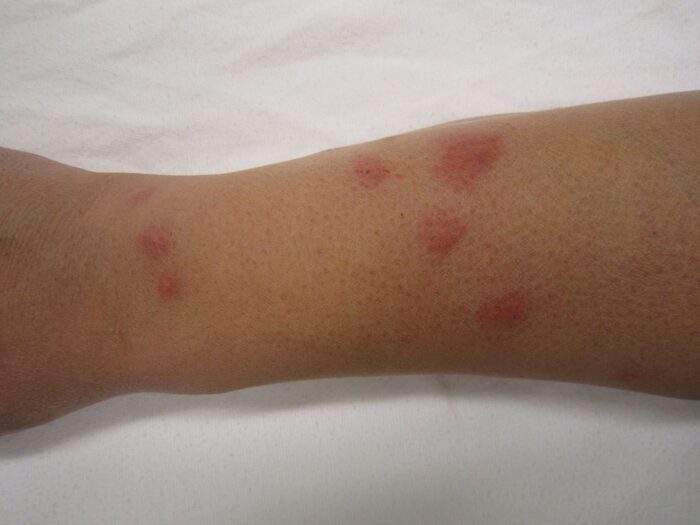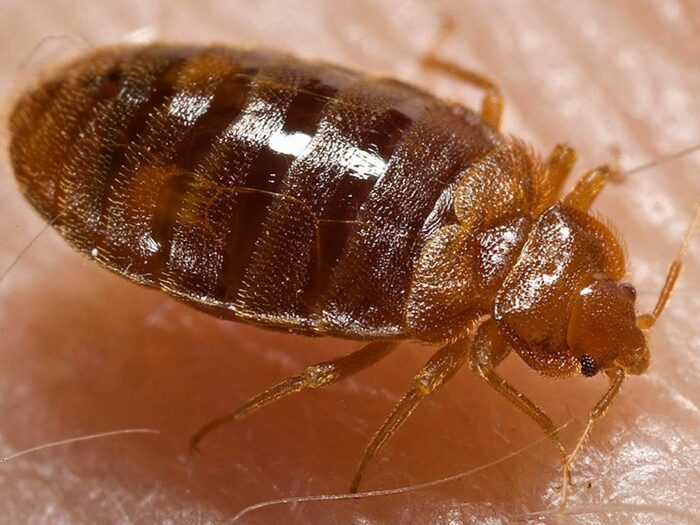
How to get rid of bed bugs
Bedbug infestations continue to plague the UK. One family has had to move out of their council flat in London due to bedbugs, while another cut short their Butlin’s break.
Mark Henderson and Chelsea Francis were so concerned about spreading bedbugs to others, they stopped leaving the property in Fulham, London. The couple are parents to two young children.
According to Henderson, his children had bedbugs in their ears, their prams and their clothes. They were even in the fridge.
Hammersmith & Fulham council has recently moved the family into a hotel while it searches for a new home.
Bedbugs at Butlin’s
Over at Butlin’s in Skegness, a family had to come home early from their holiday due to a bedbug infestation.
Rebecca Horgan was staying in a gold apartment at the Skegness resort with her five-year-old son and parents. However, Horgan says the apartment was very dirty, and her bed was infested with bedbugs.
The family had arrived for a three-night break on the Friday but decided to leave early on the Sunday to avoid the bedbugs.
Home remedy to get rid of bedbugs
For those concerned about the prospect of a bedbug infestation in their home, one cleaning expert has offered a low-cost solution.
Nigel Bearman, owner of cleaning company Daily Poppins, said baking soda is a simple bedbug-killing home remedy.
Baking soda – aka bicarbonate of soda – causes the surface fluids on the shell of bedbugs to be absorbed, causing them to dehydrate.
So grab some baking soda, sprinkle it on your bed, around your mattress, and anywhere else the insects may be hiding. The baking soda will dehydrate the bugs, killing them.
As reports of bedbug infestations rose across the UK, one holidaymaker was left scarred with bedbug bites after staying in a Blackpool hotel in September.
Sharon Haslam said the insects bit her 200 times, and left her with a red blotch on her face and arms.
Haslam and her friend Marian Pearson were staying at the Calypso Hotel in Blackpool. They woke up with an itchy rash, and found droplets of blood on their bedding and a live bedbug crawling around.

Booking.com, their travel agency, gave the pair a full refund plus £100 in compensation. Pearson was also given strong antibiotics, antihistamine tablets and creams to prevent an infection.
Her luggage went to the tip, while her clothes went into air-tight bags, which she then opened in the washing machine before washing them.
Travel reassurance
Train companies are seeking to reassure the UK public that they are taking action against a potential bedbug infestation.
Sadiq Khan, Mayor of London, has acknowledged concerns that the bedbug outbreak in Paris could cause problems in London.
“We’re taking steps to make sure we don’t have those problems in London,” Khan told PoliticsJoe. “I want to reassure those listening TfL have one of the best regimes to clean our assets on a nightly basis. We are speaking to our friends in Paris to see if there are any lessons to be learned. For a variety of reasons we don’t think those issues will arise in London; but there is no complacency from TfL.”
Deep clean
Meanwhile, the Rail Delivery Group is aiming to reassure travellers over preventative measures it is taking against a bedbug infestation. A spokesperson for the organisation told ITV Meridian, “Train operators have the expertise and experience of deep cleaning gained during the pandemic. Many are assessing what they can do to prevent a spread, including increasing the frequency of cleaning the inside of carriages or using specialist cleaning equipment.”
Pest control
As the bedbug infestation in France threatens to cross the channel, one UK council has warned it is facing a huge number of calls to deal with the unwanted insects.
Luton Council has revealed that its pest control service is “currently receiving an alarming number of bedbug jobs on a weekly basis”. It went on to warn that there were not limitless resources available to tackle the issue.
The council has issued advice to homeowners requesting a visit from a council pest control officer on what they should do to prepare their homes for treatment.
Beds should be stripped with bedcovers placed into sealed bin liners; wardrobes, drawers and bookcases should be emptied and contents placed in sealed bin liners; and furniture pulled away from walls.
The current bedbug infestation in Paris is leading to concerns over the potential for the critters to hop over the channel and start infesting homes in the UK.
There’s been plenty of footage from Paris showing the bugs crawling around buildings and transport like Metro underground trains.
Over the weekend, a passenger on the Victoria Line posted a clip to TikTok of a bedbug crawling up her leg.
“Minding my own business on the Victoria Line,” she says on the video clip.
“Said he’d got a great deal on the Eurostar and wondered if I could take him home. Sort it out Transport for London.”
Airlines and hotels across the UK are now bracing for an invasion of super-bedbugs from Paris.
What are bedbugs?
Bed bugs are wingless, red-brown coloured insects, which measure around 4mm-6mm. They can’t fly or jump, but can crawl quickly. The concern is that they’re hiding away in suitcases or rucksacks, or Eurostar seats and travelling over to the UK.

How can you prevent a bedbug infestation?
According to local services marketplace, Airtasker, keeping your bedroom clean is vital to avoiding a bedbug infestation. It warns that a dirty bed can become a breeding ground for dust mites and bed bugs, and millions of bacteria thrive in mattresses and surfaces that don’t get cleaned enough.
“The main thing to do is to make sure you clean your mattress and bedding. Do not start with the actual cleaning of the room until you’ve stripped your bed and loaded used linens in the washing machine. This way, your bedding and room are simultaneously cleaned,” the company advises.
“Clean the mattress with baking soda and essential oils, then flip it if necessary. If your mattress needs professional deep cleaning, you can always find a mattress cleaner to ensure you’re getting the best clean.”
Once you’ve taken care of the bed and bedding, move onto dusting, washing, and cleaning your bedroom, including dusting light fixtures and awkward places, shaking out rugs, and giving the room a thorough sweep, vacuum and mop.
Microbiologist and founder of Bed Bugs Ltd David Cain advises regularly checking your mattress, cleaning the frame of the bed and vacuuming around it to prevent bedbugs setting up home in your home.
Installing a bed bug monitor on your mattress will alert you to any bedbugs.
How can tell if you have bedbugs?
According to official guidance from the NHS, bedbugs can hide in many places, including on bed frames, mattresses, clothing, furniture, behind pictures and under loose wallpaper.
Signs of bedbugs include:
- bites – often on skin exposed while sleeping, like the face, neck and arms
- spots of blood on your bedding – from the bites or from squashing a bedbug
- small brown spots on bedding or furniture (bedbug poo)
How to get rid of bedbugs
The NHS advises contacting your local council or pest control service if you think you have bedbugs.
While they can be hard to find and may be resistant to some insecticides, there are some things you can try yourself.
Do
- wash affected bedding and clothing on a hot wash (60C) and tumble dry on a hot setting for at least 30 minutes
- put affected clothing and bedding in a plastic bag and put it in the freezer for 3 or 4 days
- clean and vacuum regularly – bedbugs are found in both clean and dirty places, but regular cleaning will help you spot them early
Don’t
- keep clutter around your bed
- bring second-hand furniture indoors without carefully checking it first
- take luggage or clothing indoors without checking it carefully if you have come from somewhere where you know there were bedbugs
Cain added three common mistakes to avoid:
- don’t use an aerosol-based insecticide
- don’t use a fogger for bed bugs
- don’t throw away furniture because you could introduce the bugs to any new furniture




